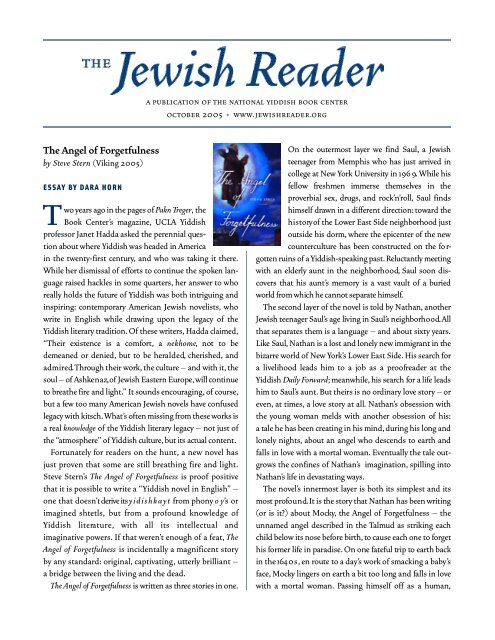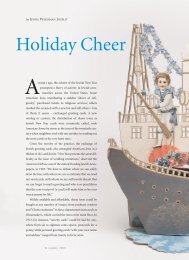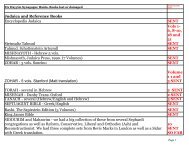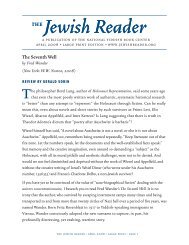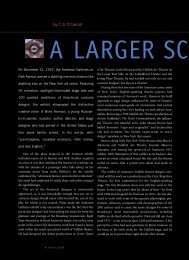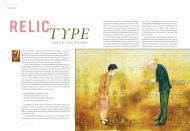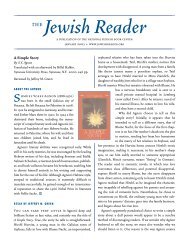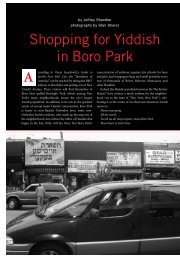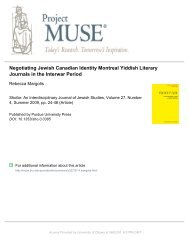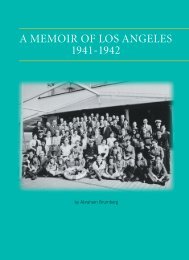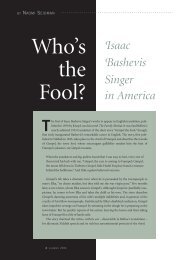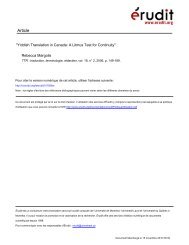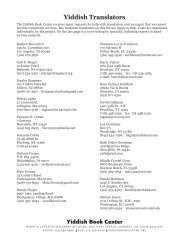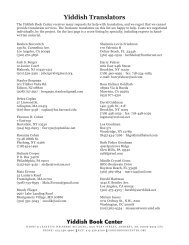Download The Jewish Reader - Yiddish Book Center
Download The Jewish Reader - Yiddish Book Center
Download The Jewish Reader - Yiddish Book Center
You also want an ePaper? Increase the reach of your titles
YUMPU automatically turns print PDFs into web optimized ePapers that Google loves.
a publication of the national yiddish book center<br />
o c t o b e r 2005 u w ww.j e w i s h r e a d er.o r g<br />
<strong>The</strong> Angel of Forgetfulness<br />
by Steve Stern (Viking 2005)<br />
E S S AY BY DARA HORN <br />
T<br />
wo years ago in the pages of Pakn Tr e g e r, t h e<br />
<strong>Book</strong> <strong>Center</strong>’s maga z i n e , UCLA Yi d d i s h<br />
p r o fessor Janet Hadda asked the perennial question<br />
about where <strong>Yiddish</strong> was headed in America<br />
in the twenty-first century, and who was taking it there.<br />
While her dismissal of e f forts to continue the spoken language<br />
raised hackles in some quarters, her answer to who<br />
really holds the future of <strong>Yiddish</strong> was both intriguing and<br />
i n s p i r i n g : c o n t e m p o ra ry American <strong>Jewish</strong> novel i s t s , w h o<br />
write in English while drawing upon the legacy of t h e<br />
<strong>Yiddish</strong> litera ry tra d i t i o n . O f these writers, Hadda claimed,<br />
“<strong>The</strong>ir existence is a comfo r t, a n e k h o m e, not to be<br />
demeaned or denied, but to be hera l d e d, c h e r i s h e d, a n d<br />
a d m i r e d.Through their work, the culture – and with it, t h e<br />
soul – of A s h ke n a z,o f <strong>Jewish</strong> Eastern Europe,will continue<br />
to breathe fire and light.” It sounds encoura g i n g, o f c o u r s e ,<br />
but a few too many American <strong>Jewish</strong> novels have confused<br />
l e gacy with kitsch.W h a t’s often missing from these works is<br />
a real k n o w l e d g e o f the <strong>Yiddish</strong> litera ry legacy – not just of<br />
the “a t m o s p h e r e” of <strong>Yiddish</strong> culture, but its actual content.<br />
Fortunately for readers on the hunt, a new novel has<br />
just proven that some are still breathing fire and light.<br />
Steve Stern’s <strong>The</strong> Angel of Fo r g e t f u l n e s s is proof positive<br />
that it is possible to write a “<strong>Yiddish</strong> novel in English” –<br />
one that doesn’t derive its y i d i s h k a y t from phony o y’s or<br />
imagined shtetls, but from a profound knowledge of<br />
<strong>Yiddish</strong> litera t u r e , with all its intellectual and<br />
imaginative powers. If that weren’t enough of a feat, T h e<br />
Angel of Forgetfulness is incidentally a magnificent story<br />
by any standard: original, captivating, utterly brilliant –<br />
a bridge between the living and the dead.<br />
<strong>The</strong> Angel of Fo r g e t f u l n e s s is written as three stories in one.<br />
On the outermost layer we find Saul, a <strong>Jewish</strong><br />
teenager from Memphis who has just arrived in<br />
college at New Yo rk University in 196 9. While his<br />
fellow freshmen immerse themselves in the<br />
p r o v e rbial sex, d r u g s , and rock’n’r o l l , Saul finds<br />
h i m s el f d rawn in a different direction: toward the<br />
h i s t o ry of the Lower East Side neighborhood just<br />
outside his dorm, where the epicenter of the new<br />
counterculture has been constructed on the fo r-<br />
gotten ruins of a <strong>Yiddish</strong>-speaking past.R eluctantly meeting<br />
with an el d e rly aunt in the neighborh o o d, Saul soon discovers<br />
that his aunt’s memory is a vast vault of a buried<br />
w o rld from which he cannot separate himsel f.<br />
<strong>The</strong> second layer of the novel is told by Nathan, a n o t h e r<br />
<strong>Jewish</strong> teenager Saul’s age living in Saul’s neighborh o o d.A l l<br />
that separates them is a language – and about sixty years.<br />
L i ke Saul, Nathan is a lost and lonely new immigrant in the<br />
b i zarre world of New Yo rk ’s Lower East Side. His search fo r<br />
a livelihood leads him to a job as a proofreader at the<br />
<strong>Yiddish</strong> Daily Fo rw a r d; m e a n w h i l e , his search for a life leads<br />
him to Saul’s aunt. But theirs is no ordinary love story – or<br />
e v e n , at times, a love story at all. N a t h a n’s obsession with<br />
the young woman melds with another obsession of h i s :<br />
a tale he has been creating in his mind, during his long and<br />
l o n ely nights, about an angel who descends to earth and<br />
falls in love with a mortal woman. Eventually the tale outgrows<br />
the confines of N a t h a n’s imagination, spilling into<br />
N a t h a n’s life in devastating ways.<br />
<strong>The</strong> novel ’s innermost layer is both its simplest and its<br />
most profo u n d.It is the story that Nathan has been writing<br />
(or is it) about Mocky, the Angel of Fo rgetfulness – the<br />
unnamed angel described in the Talmud as striking each<br />
child below its nose before birth, to cause each one to fo rg e t<br />
his former life in para d i s e . On one fateful trip to earth back<br />
in the 164 0 s , en route to a day’s work of smacking a baby’s<br />
fa c e , M o c ky lingers on earth a bit too long and falls in love<br />
with a mortal woman. Passing himsel f o f f as a human,
M o c ky marries the woman and fathers a half-angel baby.<br />
But when the pogromist Chmielnicki comes to town,<br />
M o c ky decides that “earth was no place to raise a kid,” and<br />
smuggles the baby back to para d i s e . O f c o u r s e , o n c e<br />
touched by this worl d, the child has no hope of staying in<br />
the world to come, and returns to earth as fast as he can –<br />
turning up, as it happens, on the Lower East Side.<br />
Steve Stern’s novel fits so seamlessly into the legacy of<br />
<strong>Yiddish</strong> literature that one almost feels as though one<br />
were reading in tra n s l a t i o n . For those familiar with<br />
<strong>Yiddish</strong> fiction, poetry and drama, the references to every<br />
writer from H. Leyvik to Itsik Manger are as dizzyingly<br />
exciting as the novel’s expert depiction of everything<br />
from 1910s <strong>Yiddish</strong> theater to 1970s counterculture,<br />
along with their respective sentimentalism and nihilism<br />
– and the moral questions raised by each.<br />
Yet there is something very American and particularl y<br />
Southern about his work as wel l , evocative of the great<br />
Southern writers who have also braided together memory<br />
and myth: the haze of old ruins, the lost grandeur of t h e<br />
p a s t, the sense of living in a world populated by ghosts.<br />
S a u l ’s trav els through his prolonged adolescence, i n c l u d i n g<br />
pit stops everywhere from a commune in the Oza rks to<br />
P ra g u e’s <strong>Jewish</strong> quarter under Soviet rule, become a picaresque<br />
tale reminiscent of many an American on-the-road<br />
n o v el , and a haunting suicide at the center of the book<br />
reads more like Faulkner than Pe r e t z. <strong>The</strong> connections<br />
between these worlds comes bra c i n g l y, in surprising overlapping<br />
images and symbols: a painting reappears at unexpected<br />
moments; two young men, g e n e rations apart, l i v e<br />
alone in book-filled rooms where women struggle to break<br />
through the walls of books surrounding the young men’s<br />
h e a r t s ; a treehouse Saul lives in on the commune fuses<br />
eerily with the Tree of L i fe connecting heaven and earth.<br />
What is astounding about Stern’s work is how easily he<br />
intertwines these settings and styles,as though this material<br />
were made to work in tandem. I t’s the kind of p e r fect layering<br />
that has reigned supreme in <strong>Yiddish</strong> literature since<br />
M e n d ele combined medieval <strong>Jewish</strong> legends with Don<br />
Q u i x o t e , and the kind that English readers ra r ely have the<br />
treat of e x p e r i e n c i n g . But it is also the kind of n o v el that<br />
ra r ely comes along at all, especially today: the kind of n o v el<br />
that immerses you deep into a well of legend and then ra i s e s<br />
you up refreshed and cleansed and newly aware of how little<br />
s e p a rates this world from both the prior world and the next.<br />
I f that isn’t the ability to breathe fire and light,what is JR<br />
E XCERPTS <br />
“‘My son, N a c h m a n , as you know,’” she began reading,<br />
her eyes at once starting to wander while her crooke d<br />
fingers brushed over the words like bra i l l e , “‘was reared<br />
in para d i s e…’” Lowering the pages, she informed me,<br />
“This is for us the ideal story”…a wheeze and a burb l e<br />
“…since it don’t matter should I croak before we finish.<br />
Nathan didn’t never finish the writing of it anyw a y.”<br />
T h e n , prey to a sudden considera t i o n , she gazed at me<br />
o p a q u ely over the book, s a y i n g , “So , N e p h e w…w h y<br />
d o n’t you” ( page 38)<br />
“S a c ked from every position he held for an<br />
incompetence that confirmed his worst fe a r s , N a t h a n<br />
succumbed to a crippling despondency. Had fear not<br />
outweighed his desolation, he might have followed the<br />
grimy caftan who invited him to audition for a local<br />
p i c k p o c keting academy. This was his situation when he<br />
d u c ked out of an afternoon rain shower into the<br />
d o o rway of the <strong>Jewish</strong> Daily Fo rw a r d in its new tens<br />
t o ry tower on East Broadway and diffidently peeke d<br />
inside.…Nathan stood on the threshold, too tra n s f i x e d<br />
by the chaos to flee, when a tall, b u s h y - h a i r e d<br />
gentleman in leather suspenders emerged from an<br />
office to hand him a sheaf o f handwritten pages.<br />
‘Ta ke this, m a ch shnel, to the compositor!’<br />
‘What is it’ asked Nathan.<br />
‘Holy writ,’ the man barke d, peering muddy-eyed over<br />
his spectacles at the former shlepper. ‘ I t ’s newspaper<br />
c o p y, what el s e ’<br />
‘But I don’t work here.’<br />
<strong>The</strong> bushy-haired man seemed incapable of g ra s p i n g<br />
the concept. ‘<strong>The</strong>n why are you holding my copy’<br />
Rather than return them, h o w e v e r, Nathan clutched the<br />
pages to his chest and answered experimentally,<br />
‘ Because I need a job’” ( page 45)<br />
“What they schooled us in, in our angelic cheder, w a s<br />
the wisdom we were supposed to impart to unborn<br />
s o u l s . <strong>The</strong>re was a pointlessness to this opera t i o n , s i n c e<br />
why would you fill a vessel with learning in one worl d<br />
only to empty it in another It was a cruel and unusual<br />
p r o c e s s , which made your immortal souls reluctant to<br />
assume their mortality, just as later, h aving fo rg o t t e n<br />
on earth what they’d learned in heav e n , they were<br />
the jewish reader / october 2005 / page 2
unwilling to return to para d i s e . <strong>The</strong> whole program was<br />
enough to make you wonder: Why heaven and earth in<br />
the first place What was so remarkable about the lower<br />
w o rld that the upper should be mindful of i t, and vice<br />
v e r s a ” ( page 110)<br />
“It passes through an assortment of p a t r i a r c h s ,<br />
p r o p h e t s , and fo o l s , A d a m’s soul, entering and exiting<br />
bodies with the frequency of Ka f ka changing rental<br />
u n i t s , bodies that perish from fire, w a t e r, h u n g e r,<br />
h e a r t b r e a k, and fright. It escapes through the teeth of a<br />
captured Zealot as the Romans flay his skin with iron<br />
c o m b s , only to inhabit a bride snatched by crusaders<br />
from under her marriage canopy and violated<br />
u n s p e a ka b l y. …<strong>The</strong> soul of Adam resides eventually in<br />
Isaac Lu r i a , the Ari, magician of s i x t e e n t h - c e n t u ry<br />
S a fed…it occupies as well the earth vessel of N a c h m a n<br />
o f B ra t s l av, who hides the secret of summoning the<br />
Messiah in his beautiful stories.…For a time Adam’s<br />
soul resides in the slippery instrument of H e r s h el<br />
O s t r o p o l i e r, jester to the court of the Medzibozer<br />
r eb b e , who explains on his deathbed, ‘Not dying,<br />
dieting – I’m trying to get back to my original weight of<br />
seven pounds.’” ( page 312) JR<br />
Q U E STIONS FOR DISCUSSION<br />
1) <strong>Jewish</strong> fiction dealing with American history, such as<br />
immigrant life in New York or even the more recent<br />
history of the 1960s, tends to focus on the social and<br />
political aspects of the settings it explores. Stern’s novel,<br />
by contrast, chooses to examine these settings by<br />
blending them with legend, via the experiences of his<br />
highly imaginative characters. How does this affect our<br />
understanding of the cultural past he presents<br />
2) We often imagine that the problems we face in<br />
defining ourselves in the modern era are unique to our<br />
times. What are the connections between Saul’s search<br />
for his own identity and those of his predecessors in the<br />
novel<br />
3) One of the novel’s major themes is the breaking of<br />
sexual conventions, from Nathan and Keni’s<br />
untraditional love affair in the 1910s to Saul’s virginity<br />
in the free-love atmosphere of the 1970s to Mocky’s love<br />
for a mortal woman. Is there something about breaking<br />
rules that makes love more likely or more possible, or is<br />
that idea itself one of the myths that lead these<br />
characters to stumble<br />
4) <strong>Jewish</strong> culture has always emphasized the life of the<br />
mind, especially through reading and writing, but many<br />
of the characters in <strong>The</strong> Angel of Fo r g e t f u l n e s s find that<br />
their literary imaginations are stronger than the world<br />
can accommodate. What are the powers of literature<br />
within the novel, and what are its limitations<br />
5) <strong>The</strong> novel takes place in a series of constantly<br />
changing ad-hoc settings, from an agricultural<br />
commune to an immigrant neighborhood to an<br />
inconsistent “paradise.” What do these worlds have in<br />
common How possible is it to create a new world on<br />
the ruins of an old one<br />
6) In the novel’s ad-hoc worlds, one aspect of life that is<br />
noticeably absent is one of the staples of <strong>Jewish</strong><br />
literature: families. Instead, we find characters separated<br />
from their families, whether by force or by choice. What<br />
do these characters’ lonely paths suggest about the way<br />
life must be lived when generations can no longer<br />
communicate<br />
7) What is the power of the supernatural in this book<br />
Are there sources of mystical power available in the<br />
modern world<br />
8) What is the difference between heaven and earth<br />
Dara Horn, a doctoral candidate in Hebrew and Yi d d i s h<br />
literature at Harvard, is the author of two novels: In the<br />
I m a g e , w h i ch received a National <strong>Jewish</strong> <strong>Book</strong> Award in<br />
2003, and <strong>The</strong> Wo rld to Co m e , w h i ch will be published in<br />
J a n u a ry 2006.<br />
the<br />
<strong>Jewish</strong> <strong>Reader</strong> is a publication of the<br />
National <strong>Yiddish</strong> <strong>Book</strong> <strong>Center</strong>, Amherst, MA.<br />
E d i t o r: Nancy Sherman<br />
w w w.j e w i s h r e a d e r. o r g<br />
JR<br />
the jewish reader / october 2005 / page 3


